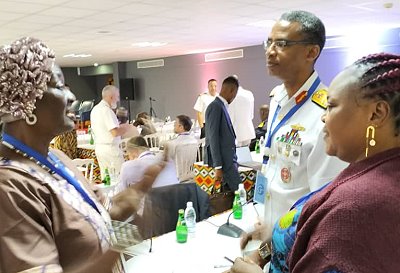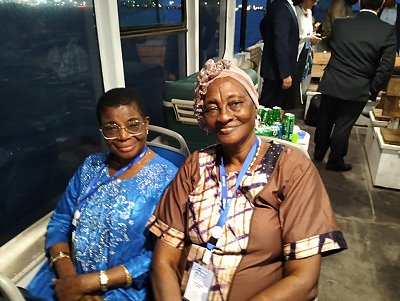 The rotating presidency of the long-standing G7++ gatherings of country representatives interested in the maritime safety of the Gulf of Guinea convened its Plenary session this year in Abidjan under the shared lead of Côte d'Ivoire and Germany. The presidency had invited this time also a few representatives of civil society with particular emphasis on the 'Blue Economy'. The SWAIMS project to which Mundus maris members had contributed in previous occasions in the form of presentations and meeting participations had proposed Prof. Stella Williams of Mundus maris as one of those speaking for civil society.
The rotating presidency of the long-standing G7++ gatherings of country representatives interested in the maritime safety of the Gulf of Guinea convened its Plenary session this year in Abidjan under the shared lead of Côte d'Ivoire and Germany. The presidency had invited this time also a few representatives of civil society with particular emphasis on the 'Blue Economy'. The SWAIMS project to which Mundus maris members had contributed in previous occasions in the form of presentations and meeting participations had proposed Prof. Stella Williams of Mundus maris as one of those speaking for civil society.
The packed programme updated participants on progress of several regular working groups and relevant projects, such as SWAIMS and several other formats of cooperation, including the 'Friends of the Gulf of Guinea' (FoGG). Panel sessions gave particular attention to such topics as 'Blue Economy', 'Women in the maritime sector', and 'Exploring links between piracy and oil theft in the Niger Delta'.
 Stella intervened in the first panel discussion on 'Blue Economy: The role of civil society in the protection of marine and coastal resources'. She advocated a nuanced approach to the malleable term 'Blue Economy' and reminded the audience that we take lots of good things from the ocean, then put our waste, our pollution, fishing overcapacity and more bad things back with lots of destructive effects. As humans collectively don't pay enough heed to nature and rather invest in their own resource intensive artefacts, the global quantity of these now exceeds the total living biomass on Earth according to recent research published in the scientific journal Nature.
Stella intervened in the first panel discussion on 'Blue Economy: The role of civil society in the protection of marine and coastal resources'. She advocated a nuanced approach to the malleable term 'Blue Economy' and reminded the audience that we take lots of good things from the ocean, then put our waste, our pollution, fishing overcapacity and more bad things back with lots of destructive effects. As humans collectively don't pay enough heed to nature and rather invest in their own resource intensive artefacts, the global quantity of these now exceeds the total living biomass on Earth according to recent research published in the scientific journal Nature.
Stella concluded her intervention with an appeal: "As civil society organisations, we invite the governments to invest heavily into the education and training of our predominantly very young populations. That is our greatest source wealth and path towards creating good futures for the people on the continent.
We also demand more policy focus on human security and well-being in ways that celebrate local culture, strengthen local innovative capacities and cooperation. There is no shortage of guidelines and recommendations. It’s time to implement. Governments carry primary responsibility, but they do well to dialogue and collaborate with civil society organisations, use and foster research and invest in local education, culture and innovation."








